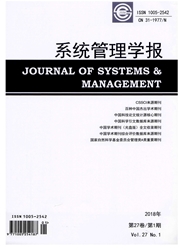

 中文摘要:
中文摘要:
多主体参与的项目团队合作模式将是未来发展的趋势,并且来自不同主体的团队成员的行为选择策略将会直接影响到团队的合作效率,甚至影响项目成败。依据社会偏好理论,在考虑代理人互惠偏好的前提下,构建了来自不同主体的多个代理人的项目团队委托代理模型,将代理人在完全理性条件下和互惠条件下的行为选择进行了比较,分析了互惠偏好对代理人努力选择、团队绩效和项目团队激励效果的影响。结果表明:互惠偏好对项目团队合作和团队绩效的促进作用并非具有绝对性,但能够提高利润分享的激励效果。最后,通过案例研究对理论研究结果进行了验证。
 英文摘要:
英文摘要:
Multi-agent cooperation will be the future trend of the development of project team. The behav- ioral choice strategy of project team members who come from different firms or organizations has a great impact on the cooperation efficiency of project team directly, and further inferences the success of a pro- ject. Based on social preference theory, we construct a principal-agency model of multi-agents in a project team under reciprocity preferences to compare the behavioral choices of agents under rationality and reci- procity, We also analyze the influence of reciprocity preference on behavioral choices of agents, team per- formance and the effective of incentives. The results indicate that the promotion effect of reciprocity on project team cooperation and performance are not absolutely positive, However it may enhance the incen- tive effectiveness of profit sharing. The theoretical results were tested by a case study as well.
 同期刊论文项目
同期刊论文项目
 同项目期刊论文
同项目期刊论文
 An ECI-based methodology for determining the final importance ratings of customer requirements in MP
An ECI-based methodology for determining the final importance ratings of customer requirements in MP 期刊信息
期刊信息
